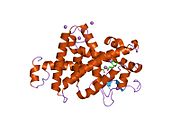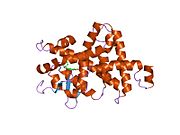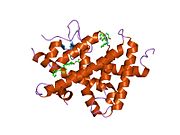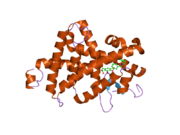Thyroid hormone receptor beta
Thyroid hormone receptor beta (TR-beta) also known as nuclear receptor subfamily 1, group A, member 2 (NR1A2), is a nuclear receptor protein that in humans is encoded by the THRB gene.[5][6]
Function
The protein encoded by this gene is a nuclear hormone receptor for triiodothyronine. It is one of the several receptors for thyroid hormone, and has been shown to mediate the biological activities of thyroid hormone. Knockout studies in mice suggest that the different receptors, while having certain extent of redundancy, may mediate different functions of thyroid hormone. Defects in this gene are known to be a cause of generalized thyroid hormone resistance (GTHR), a syndrome characterized by goiter and high levels of circulating thyroid hormone (T3-T4), with normal or slightly elevated thyroid stimulating hormone (TSH). Several transcript variants have been observed for this gene, but the full-length nature of only one has been observed so far.[7]
Interactions
Thyroid hormone receptor beta has been shown to interact with:
References
- ^ a b c GRCh38: Ensembl release 89: ENSG00000151090 – Ensembl, May 2017
- ^ a b c GRCm38: Ensembl release 89: ENSMUSG00000021779 – Ensembl, May 2017
- ^ "Human PubMed Reference:". National Center for Biotechnology Information, U.S. National Library of Medicine.
- ^ "Mouse PubMed Reference:". National Center for Biotechnology Information, U.S. National Library of Medicine.
- ^ "Entrez Gene: THRA thyroid hormone receptor, alpha (erythroblastic leukemia viral (v-erb-a) oncogene homolog, avian)".
- ^ Sakurai A, Nakai A, DeGroot LJ (June 1990). "Structural analysis of human thyroid hormone receptor beta gene". Mol. Cell. Endocrinol. 71 (2): 83–91. doi:10.1016/0303-7207(90)90245-4. PMID 1973914. S2CID 54389426.
- ^ "Entrez Gene: THRB thyroid hormone receptor, beta (erythroblastic leukemia viral (v-erb-a) oncogene homolog 2, avian)".
- ^ a b Monden T, Wondisford FE, Hollenberg AN (November 1997). "Isolation and characterization of a novel ligand-dependent thyroid hormone receptor-coactivating protein". J. Biol. Chem. 272 (47): 29834–41. doi:10.1074/jbc.272.47.29834. PMID 9368056.
- ^ Lin HM, Zhao L, Cheng SY (August 2002). "Cyclin D1 Is a Ligand-independent Co-repressor for Thyroid Hormone Receptors". J. Biol. Chem. 277 (32): 28733–41. doi:10.1074/jbc.M203380200. PMID 12048199.
- ^ a b Liu Y, Takeshita A, Misiti S, Chin WW, Yen PM (October 1998). "Lack of coactivator interaction can be a mechanism for dominant negative activity by mutant thyroid hormone receptors". Endocrinology. 139 (10): 4197–204. doi:10.1210/endo.139.10.6218. PMID 9751500.
- ^ a b Jeyakumar M, Tanen MR, Bagchi MK (June 1997). "Analysis of the functional role of steroid receptor coactivator-1 in ligand-induced transactivation by thyroid hormone receptor". Mol. Endocrinol. 11 (6): 755–67. doi:10.1210/mend.11.6.0003. PMID 9171239.
- ^ Lee SK, Jung SY, Kim YS, Na SY, Lee YC, Lee JW (February 2001). "Two distinct nuclear receptor-interaction domains and CREB-binding protein-dependent transactivation function of activating signal cointegrator-2". Mol. Endocrinol. 15 (2): 241–54. doi:10.1210/mend.15.2.0595. PMID 11158331.
- ^ Lee SK, Anzick SL, Choi JE, Bubendorf L, Guan XY, Jung YK, Kallioniemi OP, Kononen J, Trent JM, Azorsa D, Jhun BH, Cheong JH, Lee YC, Meltzer PS, Lee JW (November 1999). "A nuclear factor, ASC-2, as a cancer-amplified transcriptional coactivator essential for ligand-dependent transactivation by nuclear receptors in vivo". J. Biol. Chem. 274 (48): 34283–93. doi:10.1074/jbc.274.48.34283. PMID 10567404.
- ^ Ko L, Cardona GR, Chin WW (May 2000). "Thyroid hormone receptor-binding protein, an LXXLL motif-containing protein, functions as a general coactivator". Proc. Natl. Acad. Sci. U.S.A. 97 (11): 6212–7. Bibcode:2000PNAS...97.6212K. doi:10.1073/pnas.97.11.6212. PMC 18584. PMID 10823961.
- ^ Ko L, Cardona GR, Iwasaki T, Bramlett KS, Burris TP, Chin WW (January 2002). "Ser-884 adjacent to the LXXLL motif of coactivator TRBP defines selectivity for ERs and TRs". Mol. Endocrinol. 16 (1): 128–40. doi:10.1210/mend.16.1.0755. PMID 11773444.
- ^ Tagami T, Lutz WH, Kumar R, Jameson JL (December 1998). "The interaction of the vitamin D receptor with nuclear receptor corepressors and coactivators". Biochem. Biophys. Res. Commun. 253 (2): 358–63. doi:10.1006/bbrc.1998.9799. PMID 9878542.
- ^ Ando S, Sarlis NJ, Krishnan J, Feng X, Refetoff S, Zhang MQ, Oldfield EH, Yen PM (September 2001). "Aberrant alternative splicing of thyroid hormone receptor in a TSH-secreting pituitary tumor is a mechanism for hormone resistance". Mol. Endocrinol. 15 (9): 1529–38. doi:10.1210/mend.15.9.0687. PMID 11518802.
- ^ Zhu XG, Park KS, Kaneshige M, Bhat MK, Zhu Q, Mariash CN, McPhie P, Cheng SY (April 2000). "The orphan nuclear receptor Ear-2 is a negative coregulator for thyroid hormone nuclear receptor function". Mol. Cell. Biol. 20 (7): 2604–18. doi:10.1128/MCB.20.7.2604-2618.2000. PMC 85476. PMID 10713182.
- ^ Wu Y, Delerive P, Chin WW, Burris TP (March 2002). "Requirement of helix 1 and the AF-2 domain of the thyroid hormone receptor for coactivation by PGC-1". J. Biol. Chem. 277 (11): 8898–905. doi:10.1074/jbc.M110761200. PMID 11751919.
Further reading
- Lazar MA, Chin WW (1990). "Nuclear thyroid hormone receptors". J. Clin. Invest. 86 (6): 1777–82. doi:10.1172/JCI114906. PMC 329808. PMID 2254444.
- Forrest D, Reh TA, Rüsch A (2002). "Neurodevelopmental control by thyroid hormone receptors". Curr. Opin. Neurobiol. 12 (1): 49–56. doi:10.1016/S0959-4388(02)00289-1. PMID 11861164. S2CID 2884828.
- González-Sancho JM, García V, Bonilla F, Muñoz A (2003). "Thyroid hormone receptors/THR genes in human cancer". Cancer Lett. 192 (2): 121–32. doi:10.1016/S0304-3835(02)00614-6. PMID 12668276.
- Cugini CD, Leidy JW, Chertow BS, Bérard J, Bradley WE, Menke JB, Hao EH, Usala SJ (1992). "An arginine to histidine mutation in codon 315 of the c-erbA beta thyroid hormone receptor in a kindred with generalized resistance to thyroid hormones results in a receptor with significant 3,5,3'-triiodothyronine binding activity". J. Clin. Endocrinol. Metab. 74 (5): 1164–70. doi:10.1210/jcem.74.5.1314846. PMID 1314846.
- Behr M, Loos U (1992). "A point mutation (Ala229 to Thr) in the hinge domain of the c-erbA beta thyroid hormone receptor gene in a family with generalized thyroid hormone resistance". Mol. Endocrinol. 6 (7): 1119–26. doi:10.1210/mend.6.7.1324420. PMID 1324420.
- Falcone M, Miyamoto T, Fierro-Renoy F, Macchia E, DeGroot LJ (1992). "Antipeptide polyclonal antibodies specifically recognize each human thyroid hormone receptor isoform". Endocrinology. 131 (5): 2419–29. doi:10.1210/endo.131.5.1425440. PMID 1425440.
- Schmidt ED, Schmidt ED, van der Gaag R, Ganpat R, Broersma L, de Boer PA, Moorman AF, Lamers WH, Wiersinga WM, Koornneef L (1992). "Distribution of the nuclear thyroid-hormone receptor in extraocular and skeletal muscles". J. Endocrinol. 133 (1): 67–74. doi:10.1677/joe.0.1330067. PMID 1517709.
- Adams M, Nagaya T, Tone Y, Jameson JL, Chatterjee VK (1992). "Functional properties of a novel mutant thyroid hormone receptor in a family with generalized thyroid hormone resistance syndrome". Clin. Endocrinol. 36 (3): 281–9. doi:10.1111/j.1365-2265.1992.tb01444.x. PMID 1563081. S2CID 25897422.
- Sasaki S, Nakamura H, Tagami T, Miyoshi Y, Tanaka K, Imura H (1992). "A point mutation of the T3 receptor beta 1 gene in a kindred of generalized resistance to thyroid hormone". Mol. Cell. Endocrinol. 84 (3): 159–66. doi:10.1016/0303-7207(92)90026-3. PMID 1587388. S2CID 24853283.
- Nagaya T, Madison LD, Jameson JL (1992). "Thyroid hormone receptor mutants that cause resistance to thyroid hormone. Evidence for receptor competition for DNA sequences in target genes". J. Biol. Chem. 267 (18): 13014–9. doi:10.1016/S0021-9258(18)42375-7. PMID 1618799.
- Shuto Y, Wakabayashi I, Amuro N, Minami S, Okazaki T (1992). "A point mutation in the 3,5,3'-triiodothyronine-binding domain of thyroid hormone receptor-beta associated with a family with generalized resistance to thyroid hormone". J. Clin. Endocrinol. Metab. 75 (1): 213–7. doi:10.1210/jcem.75.1.1619012. PMID 1619012.
- Näär AM, Boutin JM, Lipkin SM, Yu VC, Holloway JM, Glass CK, Rosenfeld MG (1991). "The orientation and spacing of core DNA-binding motifs dictate selective transcriptional responses to three nuclear receptors". Cell. 65 (7): 1267–79. doi:10.1016/0092-8674(91)90021-P. PMID 1648451. S2CID 22572347.
- Usala SJ, Menke JB, Watson TL, Wondisford FE, Weintraub BD, Bérard J, Bradley WE, Ono S, Mueller OT, Bercu BB (1991). "A homozygous deletion in the c-erbA beta thyroid hormone receptor gene in a patient with generalized thyroid hormone resistance: isolation and characterization of the mutant receptor". Mol. Endocrinol. 5 (3): 327–35. doi:10.1210/mend-5-3-327. PMID 1653889.
- Bodenner DL, Mroczynski MA, Weintraub BD, Radovick S, Wondisford FE (1991). "A detailed functional and structural analysis of a major thyroid hormone inhibitory element in the human thyrotropin beta-subunit gene". J. Biol. Chem. 266 (32): 21666–73. doi:10.1016/S0021-9258(18)54688-3. PMID 1657975.
- Parrilla R, Mixson AJ, McPherson JA, McClaskey JH, Weintraub BD (1991). "Characterization of seven novel mutations of the c-erbA beta gene in unrelated kindreds with generalized thyroid hormone resistance. Evidence for two "hot spot" regions of the ligand binding domain". J. Clin. Invest. 88 (6): 2123–30. doi:10.1172/JCI115542. PMC 295818. PMID 1661299.
- Usala SJ, Menke JB, Watson TL, Bérard WE, Bradley C, Bale AE, Lash RW, Weintraub BD (1991). "A new point mutation in the 3,5,3'-triiodothyronine-binding domain of the c-erbA beta thyroid hormone receptor is tightly linked to generalized thyroid hormone resistance". J. Clin. Endocrinol. Metab. 72 (1): 32–8. doi:10.1210/jcem-72-1-32. PMID 1846005.
- Usala SJ, Tennyson GE, Bale AE, Lash RW, Gesundheit N, Wondisford FE, Accili D, Hauser P, Weintraub BD (1990). "A base mutation of the C-erbA beta thyroid hormone receptor in a kindred with generalized thyroid hormone resistance. Molecular heterogeneity in two other kindreds". J. Clin. Invest. 85 (1): 93–100. doi:10.1172/JCI114438. PMC 296391. PMID 2153155.
- Sakurai A, Takeda K, Ain K, Ceccarelli P, Nakai A, Seino S, Bell GI, Refetoff S, DeGroot LJ (1989). "Generalized resistance to thyroid hormone associated with a mutation in the ligand-binding domain of the human thyroid hormone receptor beta". Proc. Natl. Acad. Sci. U.S.A. 86 (22): 8977–81. Bibcode:1989PNAS...86.8977S. doi:10.1073/pnas.86.22.8977. PMC 298414. PMID 2510172.
This article incorporates text from the United States National Library of Medicine, which is in the public domain.



















